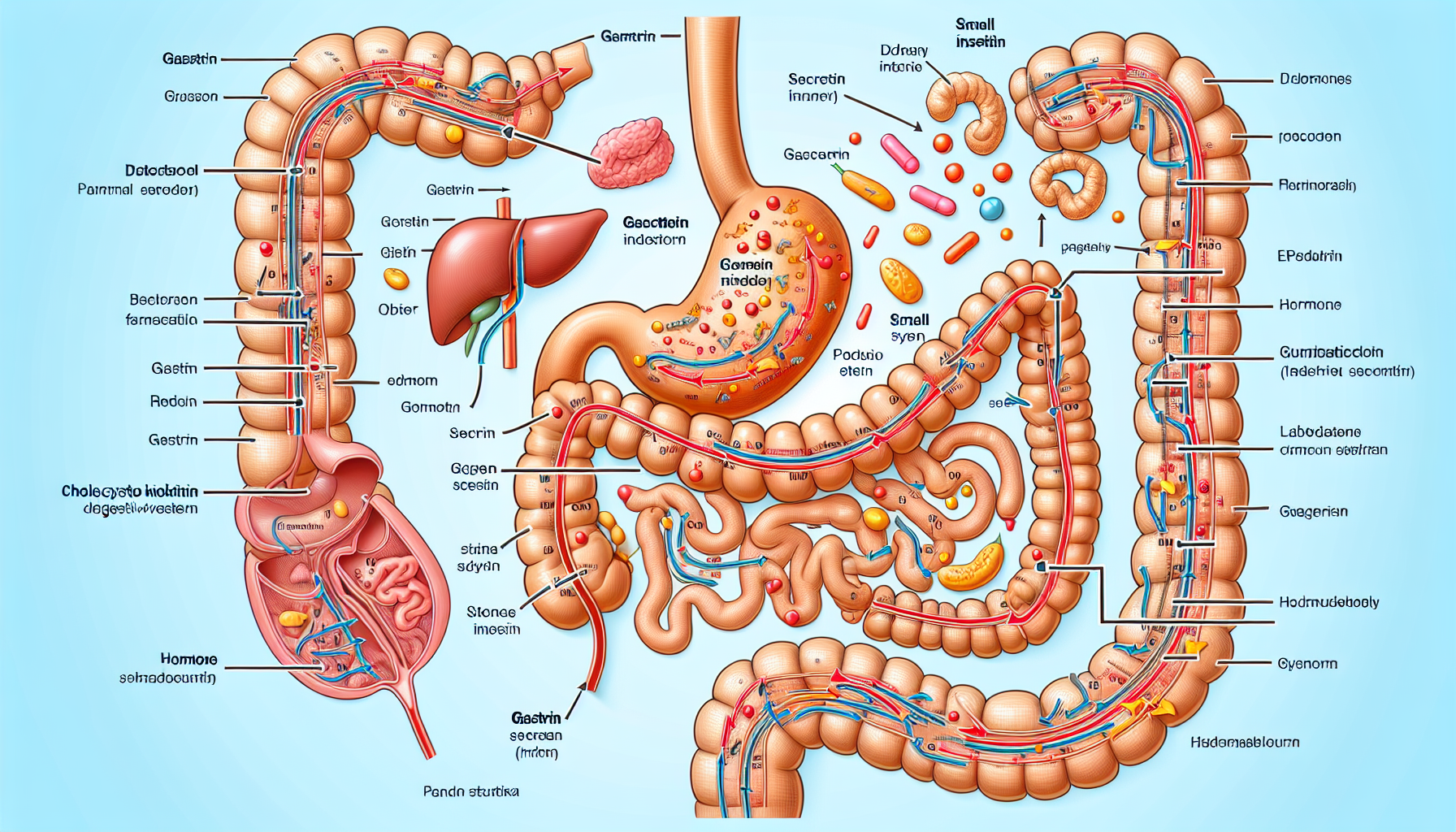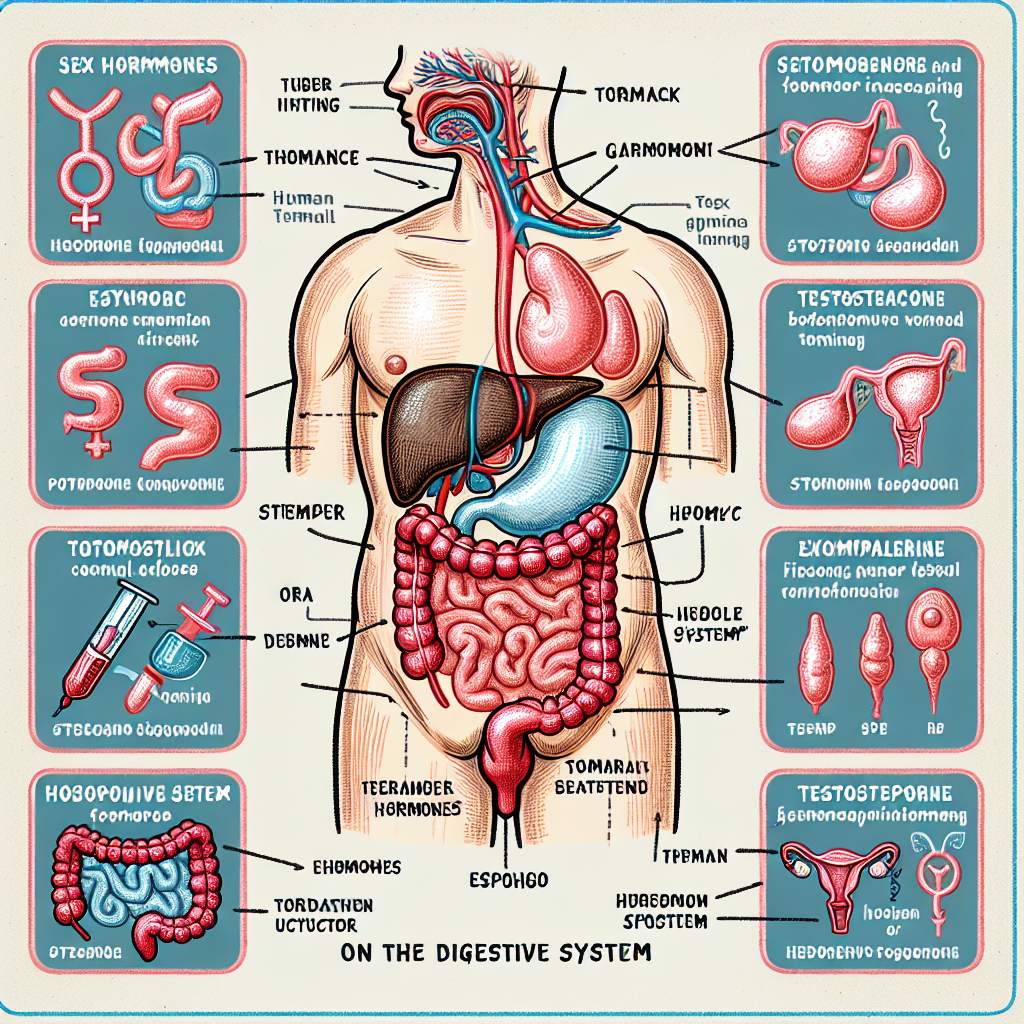Hormones are the body’s chemical messengers, influencing nearly every physiological process, including the digestion of our food. The complexity of the digestive system is mirrored by the intricate hormonal signals that govern it. Understanding the interplay between hormones and digestive health is crucial, as it can lead to better management of digestive disorders and overall wellbeing.
Hormones: The Digestive Conductors
Digestion is a symphonic interplay between various organs, each with a specific role, all orchestrated by hormones. Hormones regulate the digestive system by controlling appetite, digestion rate, nutrient absorption, and waste elimination. They are secreted by glands such as the pancreas, thyroid, and adrenal glands, and even by the digestive tract itself.
The Role of Gut Hormones
Gut hormones, such as ghrelin, secretin, and cholecystokinin (CCK), are pivotal in managing hunger and fullness, stimulating digestive juices, and facilitating nutrient breakdown and absorption. Ghrelin, known as the ‘hunger hormone,’ is produced in the stomach and signals the brain to stimulate appetite. Secretin and CCK, on the other hand, aid in the digestion of food by stimulating the pancreas and gallbladder.
The Thyroid Hormone Connection
The thyroid gland produces hormones that can significantly affect digestion. Hypothyroidism, a condition where the thyroid doesn’t produce enough hormones, can lead to a sluggish digestive system, resulting in constipation. Conversely, hyperthyroidism can cause an overactive digestive system, leading to frequent bowel movements.
Stress Hormones and Digestion
Stress can directly impact digestive health through hormones such as cortisol and adrenaline. These hormones can disrupt digestive processes, leading to symptoms like stomachaches, diarrhea, or constipation. For more insights into managing stress for gastrointestinal well-being, explore the resource on Assessing the Role of Stress Management in Gastrointestinal Well-Being.
Implications of Hormonal Imbalance
A hormonal imbalance can lead to various digestive issues, from acid reflux to irritable bowel syndrome (IBS). For instance, fluctuations in estrogen and progesterone during the menstrual cycle can affect bowel movements. Additionally, insulin, a hormone produced by the pancreas, is essential in regulating blood sugar levels, and imbalances can lead to diabetes, which has known gastrointestinal implications.
Hormones and Gastrointestinal Disorders
Conditions such as gastroesophageal reflux disease (GERD) and peptic ulcers have been linked to hormonal changes. GERD can be exacerbated by certain hormones that relax the esophageal sphincter, allowing stomach acid to enter the esophagus. For a deeper understanding of dietary management in these conditions, the article on Evaluating the Role of Diet in Peptic Ulcer Disease provides valuable information.
The Impact of Sex Hormones
Sex hormones, particularly in women, can significantly influence digestive health. Conditions like endometriosis can impact the gastrointestinal tract, causing symptoms like nausea and bloating. It’s essential to acknowledge the unique aspects of digestive health related to hormonal fluctuations in different genders.
Regulating Hormones for Better Digestive Health
To maintain a harmonious hormonal balance and support digestive health, lifestyle modifications can be instrumental. This includes a balanced diet, regular exercise, and stress management techniques. Incorporating practices such as yoga can also be beneficial, as highlighted in the article on The Role of Yoga in Improving Digestive Function.
Diet and Hormones
A diet that supports hormonal balance is rich in fiber, lean proteins, healthy fats, and probiotics. Foods like leafy greens, nuts, and fermented products can positively influence hormone levels and, consequently, digestive health. For those with lactose intolerance, understanding dietary management is critical, as described in the resource on Understanding Lactose Intolerance and Its Dietary Management.
Exercise and Hormonal Health
Regular physical activity can help regulate hormones like insulin and cortisol, thereby improving digestive function. Exercise stimulates muscular contractions in the gastrointestinal tract, aiding in the movement of food and reducing constipation.
Stress Reduction Techniques
Stress management techniques such as mindfulness meditation, deep breathing exercises, and adequate sleep can help regulate stress hormones, leading to a healthier digestive system.
Medical Interventions
In some cases, medical interventions might be necessary to manage hormonal imbalances affecting digestion. This includes hormone replacement therapy, medications to regulate thyroid function, or insulin therapy for diabetes management.
Supporting Research and Further Reading
For those interested in delving deeper into specific aspects of hormones and digestive health, here are some high-quality external resources:
- An insightful study on the effects of thyroid hormones on the gastrointestinal tract is hosted by the National Institutes of Health.
- Research on the impact of stress on gastrointestinal health can be found in an article from the American Psychological Association.
- For comprehensive information on the role of diet in hormone regulation, the Harvard Medical School offers an excellent overview.
- An in-depth review of the interplay between exercise and gut health is available through the International Journal of Sport Nutrition and Exercise Metabolism.
For individuals facing hormone-related digestive issues, it’s essential to seek guidance from healthcare professionals who can provide personalized advice and treatment plans.
In conclusion, the relationship between hormones and digestive health is complex and essential. By understanding and managing this interplay, individuals can improve their digestive wellness and overall quality of life. Whether through lifestyle changes, diet, stress management, or medical interventions, taking steps to support hormonal balance can lead to significant improvements in digestive health.



